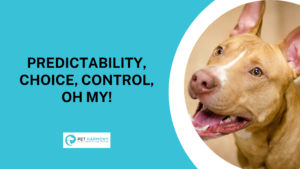
Over the past few years, conversations in the animal training community about predictability, choice, control, and agency have become more common–which is a great thing! But these terms can be somewhat confusing, and if you’re new to these topics – especially concerning animal welfare – they may seem… you know… a little “why should I care about this?”
So let’s talk more about what these terms mean, how they relate to each other, and why they matter to anyone who lives and/or works with animals.
Choice and Control
Let’s start with agency and work backward from there. “Agency” means that an individual has control over their own outcomes.
In order for a learner to have control over their outcomes, they must have choices so they can select their desired outcome. So, choice is a necessary component of control, but control doesn’t necessarily happen as a result of every choice. For example, a dog in a playgroup who doesn’t want to play with other dogs can choose to either sit in front of the gate, or cower in a corner, or any number of other avoidant behaviors–but if the people running the playgroup don’t honor the dog’s request to leave through the gate when they sit there, the dog’s choice had no impact on their outcome. So think of control like squares and choice like rectangles: in the same way that all squares are rectangles but not all rectangles are squares, all control involves being able to make choices, but not all choices result in having control.
Another point about choice: “do it or else” isn’t really a choice. In order for a choice to be a choice, there must be two or more desirable outcomes. If the only options are carrot or stick, no emotionally and behaviorally healthy individual is going to choose the stick, which means it’s not really a choice. So it’s our job as caregivers to arrange the environment so that our learners have multiple desirable options at their disposal.
Predictability
Predictability is more distantly related to choice and control, in that it isn’t necessarily a part of the definition of agency, but it does play an important role in why all this stuff matters. Fortunately for us, predictability doesn’t mean that we have to have our days scheduled down to the 15-minute segments and we never waiver from the plan. That wouldn’t be sustainable for most of us! What a relief that ain’t it!
Think of predictability as reliable if-then contingencies.
- If mom calls me and I come to her, then good things will happen.
- If I go to my relaxation station, then I will be safe.
- If Fluffy gets fed, then I’ll get fed next.
- If I eat my food at my station, then it will not be stolen by anyone else in the house.
Predictability gives individuals a sense of trust and security.
Ok, but…
So that’s all super neat, but why does it matter?
Well, from the animal’s point of view, it matters because individuals who have a robust amount of agency in their lives are typically physically, emotionally, and behaviorally healthier than individuals who don’t. Similarly, individuals who have a lot of predictability and reliability in their environment and relationships are typically more secure and trusting than those who don’t. Agency and predictability are fundamental components of good welfare.
And from the human’s point of view, pets are expensive, messy, and live heartbreakingly short lives (for the most part). And most animal-related jobs are both physically and emotionally taxing, pay only a fraction of human-oriented parallel professions, and aren’t particularly respected in the rest of society. The overwhelming majority of people who are willing to deal with all of that do so because they passionately love animals.
And that means we don’t only want the animals in our care to be physically, behaviorally, and emotionally healthy so they can be their best selves, we also want to have the best possible relationship with them–a relationship built on trust.
But relinquishing control is hard!
It can be scary to replace control with trust. We want to control the animals in our care because we’re afraid of what they’ll choose if we let them make choices. We want to control them because we’ve been taught since birth that that’s what we’re supposed to do. We want to control them because, yeah, being in control feels good! But time and time again, when we teach our clients and students how to give the animals in their care abundant choice, control, and predictability they tell us the same thing:
“I already loved my pet and had a good relationship with them, but I had no idea how much better it could be. I didn’t think a relationship like this was possible.”
Now What?
- Watch this video about building trust in your relationships.
- If you need additional help, you can schedule an appointment with one of the Pet Harmony behavior consultants.


